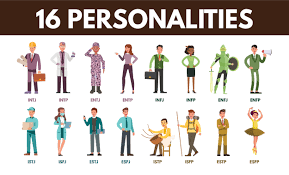Personality refers to individual differences in characteristic patterns of thinking, feeling and behaving. The study of personality focuses on two broad areas: One is understanding individual differences in particular personality characteristics, such as sociability or irritability.
Personality is the characteristic sets of behaviors, cognitions, and emotional patterns that evolve from biological and environmental factors. While there is no generally agreed upon definition of personality, most theories focus on motivation and psychological interactions with the environment one is surrounded
VOCABULARY: broad areas, irritability, sciability, cognitions, evolve
~~~~~~~~~~~~~~~~~~
The term personality has been defined in many ways, but as a psychological concept two main meanings have evolved. The first pertains to the consistent differences that exist between people: in this sense, the study of personality focuses on classifying and explaining relatively stable human psychological characteristics. The second meaning emphasizes those qualities that make all people alike and that distinguish psychological man from other species; it directs the personality theorist to search for those regularities among all people that define the nature of man as well as the factors that influence the course of lives.
VOCABULARY: term, concept, consistent, exist, stable, distinguish, reglularities
This duality may help explain the two directions that personality studies have taken: on the one hand, the study of ever more specific qualities in people, and, on the other, the search for the organized totality of psychological functions that emphasizes the interplay between organic and psychological events within people and those social and biological events that surround them. The dual definition of personality is interwoven in most of the topics discussed below. It should be emphasized, however, that no definition of personality has found universal acceptance within the field.
VOCABULARY: duality, totality, functions, interplay, surround, interwoven, topics, acceptance
The study of personality can be said to have its origins in the fundamental idea that people are distinguished by their characteristic individual patterns of behaviour—the distinctive ways in which they walk, talk, furnish their living quarters, or express their urges. Whatever the behaviour, personologists—as those who systematically study personality are called—examine how people differ in the ways they express themselves and attempt to determine the causes of these differences. Although other fields of psychology examine many of the same functions and processes, such as attention, thinking, or motivation, the personologist places emphasis on how these different processes fit together and become integrated so as to give each person a distinctive identity, or personality. The systematic psychological study of personality has emerged from a number of different sources, including psychiatric case studies that focused on lives in distress, from philosophy, which explores the nature of man, and from physiology, anthropology, and social psychology.
VOCABULARY: furnish their living quarters, urges, personologists, emphasis, intergrated, systematic, sources
Physiological type theories
The idea that people fall into certain personality type categories in relation to bodily characteristics has intrigued numerous modern psychologists as well as their counterparts among the ancients. The idea that people must fall into one or another rigid personality class, however, has been largely dismissed. Two general sets of theories are considered here, the humoral and the morphological.
VOCABULARY: fall into, bodily, intrigued, numerous, rigid, humoral, morphological
Humoral theories
Perhaps the oldest personality theory known is contained in the cosmological writings of the Greek philosopher and physiologist Empedocles and in related speculations of the physician Hippocrates. Empedocles’ cosmic elements—air (with its associated qualities, warm and moist), earth (cold and dry), fire (warm and dry), and water (cold and moist)—were related to health and corresponded (in the above order) to Hippocrates’ physical humours, which were associated with variations in temperament: blood (sanguine temperament), black bile (melancholic), yellow bile (choleric), and phlegm (phlegmatic). This theory, with its view that body chemistry determines temperament, has survived in some form for more than 2,500 years.
VOCABULARY: cosmological, moist, humours, temperament, sanguine, black bile, melancholic, choleric, phlegm
According to these early theorists, emotional stability as well as general health depend on an appropriate balance among the four bodily humours; an excess of one may produce a particular bodily illness or an exaggerated personality trait. Thus, a person with an excess of blood would be expected to have a sanguine temperament—that is, to be optimistic, enthusiastic, and excitable. Too much black bile (dark blood perhaps mixed with other secretions) was believed to produce a melancholic temperament. An oversupply of yellow bile (secreted by the liver) would result in anger, irritability, and a “jaundiced” view of life.
VOCABULARY: exaggerated, trait, excitable, oversupply, liver, jaundiced
Morphological (body type) theories
Related to the biochemical theories are those that distinguish types of personalities on the basis of body shape (somatotype). Such a morphological theory was developed by the German psychiatrist Ernst Kretschmer. In his book Physique and Character, first published in 1921, he wrote that among his patients a frail, rather weak (asthenic) body build as well as a muscular (athletic) physique were frequently characteristic of schizophrenic patients, while a short, rotund (pyknic) build was often found among manic-depressive patients. Kretschmer extended his findings and assertions in a theory that related body build and personality in all people and wrote that slim and delicate physiques are associated with introversion, while those with rounded heavier and shorter bodies tend to be cyclothymic—that is, moody but often extroverted and jovial.
VOCABULARY: morphological, somatotype, frail, rotund, pyknic, manic-depressive, cyclothymic, moody, jovial

